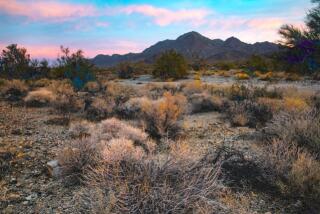Geothermal Plant Near Tribal Site Approved
- Share via
The Bush administration gave Calpine Corp. permission Tuesday to develop a 48-megawatt geothermal power plant beside Medicine Lake in California’s volcanic far north, reversing a 2000 decision that blocked the project and angering Native Americans who consider the area sacred.
Officials with the Department of the Interior and U.S. Forest Service said the San Jose-based energy firm now can drill geothermal wells on a 15-acre site known as Telephone Flat, about a mile from the lake’s edge.
Bush administration officials stressed the project’s potential role in inching the U.S. closer to energy independence. Rebecca W. Watson, assistant Interior secretary, said geothermal development in the Medicine Lake Highlands would “help the nation take steps toward increasing domestic energy supplies, particularly from renewable sources.”
The project involves taking naturally heated water from deep underground, using it to generate power, then pumping the water back into the ground to be reheated and reused.
As part of the decision to approve the project, the government will require some changes which officials said would reduce the intrusion on Native American sites. One would require that a power line from the plant be moved several miles to skirt the Medicine Lake Area Traditional Cultural Places District and the Mt. Hoffman roadless area.
Nonetheless, spokesmen for local Native American tribes and environmentalists said federal officials were selling out to big energy. The project, they said, would produce a meager amount of electricity while wounding a rugged landscape of conifers and sparkling hills of obsidian 30 miles east of Mt. Shasta.
Vernon Johnson, a member of the Pit River Tribe and executive director of the California Council of Tribal Governments, said he was disappointed that tribal concerns were brushed aside. But he was hardly surprised.
“They’ve been doing that all along through history,” said Johnson, 73. “This whole system is corrupt.”
Calpine is already drilling exploratory wells on a geothermal site several miles north of Medicine Lake. But foes had hoped geothermal development was permanently blocked at Telephone Flat, which is even closer to the lake.
Kent Robertson, a Calpine spokesman, said test wells started over the summer produced “promising results.” The firm plans further exploration to determine whether underground pockets of water beneath the area are hot enough to fuel a $120-million power plant.
If so, it could trigger extensive geothermal development in the area. Calpine owns 43 federal leases covering 47,800 acres in the Medicine Lake Highlands.
Native Americans say they worry that the drilling will drain spiritual energy from a land they’ve used for hundreds of generations as a sacred healing place. Many elderly tribal leaders say native people who dunk themselves in the lake have witnessed miraculous recoveries from serious illnesses.
The government reversal “flies in the face of all efforts to protect sacred sites over the years,” said Gene Preston, Pit River Tribe chairman.
Michelle Berditschevsky, the tribe’s environmental coordinator, said the project wouldn’t even help California meet its renewable energy obligations. Calpine has already sold any electricity from the site to the Bonneville Power Administration, which does not serve California.
Owners of lakefront vacation homes likewise expressed dismay and vowed to sue. Sen. Barbara Boxer (D-Calif.) also weighed in against the project. “If the project were to proceed,” Boxer wrote Bush regulators, “the unique and sacred character of the Medicine Lake Caldera will forever be lost.”
The decision comes two years after Clinton administration regulators declared that no geothermal development would be allowed at Telephone Flat. They said a power plant close to the lake could trample tribes’ cultural values and harm the scenic charm for recreational visitors.
To settle a $100-million lawsuit by Calpine, Bush administration officials agreed in April to reconsider the project. Even then, Calpine retained the right to pursue its lawsuit if federal officials balked again. Dale Bosworth, U.S. Forest Service chief, said the decision Tuesday “fulfills the government’s 20-year obligation to the leaseholder.”
Geothermal leases in the Medicine Lake Highlands were first sold in 1982, and renewed in 1998.
Deborah Sivas, director of Earthjustice Environmental Law Clinic at Stanford, who is representing the tribes, said those actions took place without sufficient environmental review and consultation with Indians. Tuesday’s decision, she said, only makes matters worse.
“Nothing has changed since this decision was made a couple years ago,” said Sivas.
More to Read
Inside the business of entertainment
The Wide Shot brings you news, analysis and insights on everything from streaming wars to production — and what it all means for the future.
You may occasionally receive promotional content from the Los Angeles Times.










